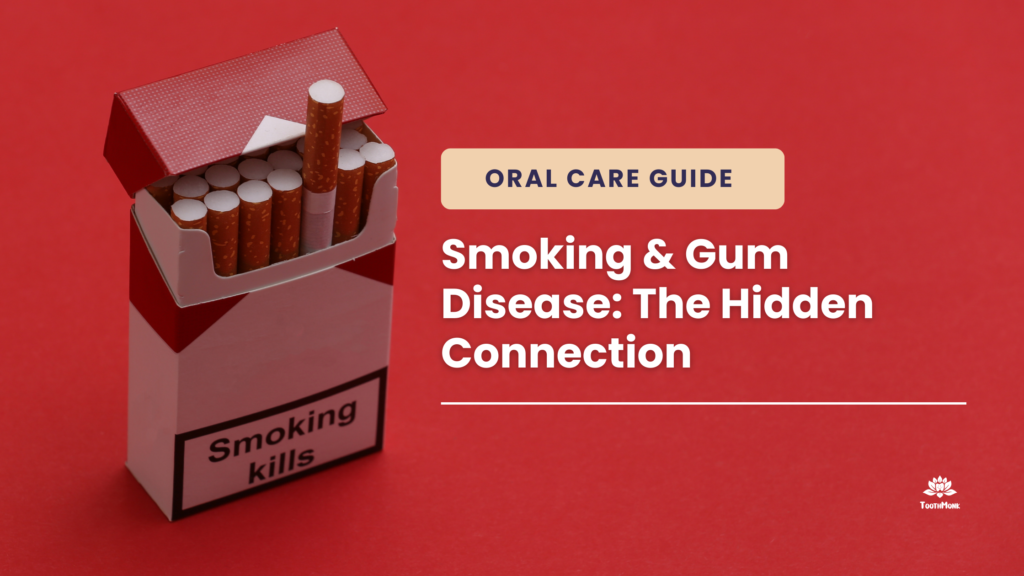
A Story of Silent Damage
Arjun had always considered himself healthy. At 32, he was active, had a successful career, and believed that smoking a few cigarettes a day was just a small indulgence, something that helped him unwind after a stressful day. He had been smoking since college, brushing off concerns with a casual, “I’ll quit when I need to.” But lately, something had changed. His gums bled every time he brushed. His breath had a persistent foul odor, and his teeth had started to feel loose. It was nothing serious, he thought, until he visited his dentist.
Sitting in the dentist’s chair, Arjun heard something that sent shivers down his spine: “You have advanced periodontitis. If we don’t intervene, you could start losing teeth soon.”
The Hidden Danger Behind Every Puff
Most smokers, like Arjun, don’t realize that smoking is one of the leading causes of gum disease. It’s not just about stained teeth or bad breath, it’s about the gradual destruction of the very foundation holding your teeth in place. Smoking weakens the immune system, making it harder for your body to fight infections, including those affecting the gums.
When bacteria from plaque build up along the gum line, the body’s natural response is to fight the infection. But smoking reduces blood flow to the gums, cutting off the nutrients and oxygen they need to heal. Over time, this leads to gingivitis (early-stage gum disease) and, if left untreated, progresses to periodontitis (severe gum disease)a condition where the gums pull away from the teeth, forming deep pockets filled with harmful bacteria. This eventually results in bone loss and, ultimately, tooth loss.
How Smoking Worsens Gum Disease
- Reduced Blood Flow: Smoking restricts blood vessels, leading to poor circulation in the gums. This means they don’t get enough oxygen and nutrients to stay healthy.
- Weakened Immune System: Smokers have a harder time fighting off infections, allowing bacteria to thrive in the gums.
- Delayed Healing: After a dental procedure or even minor gum irritation, smokers take longer to heal due to reduced blood supply.
- Masked Symptoms: One of the most dangerous effects of smoking is that it can hide the symptoms of gum disease. Smokers may not notice inflammation or bleeding gums as much as non-smokers because nicotine reduces blood flow, making it seem like everything is fine, until it’s too late.
The Turning Point: Quitting for a Healthier Smile
When Arjun’s dentist explained all this, he felt a deep sense of regret. He had never imagined that smoking could have such a devastating effect on his oral health. Determined to save his teeth, he made a life-changing decision: he quit smoking.
It wasn’t easy. The cravings were intense, and he often found himself reaching for a cigarette out of habit. But every time he did, he remembered what his dentist said: “The sooner you quit, the better your gums can heal.” With time, his gums started to recover. The bleeding reduced, his breath improved, and he felt healthier overall.
What You Can Do to Protect Your Gums
- Quit Smoking: This is the single most important step you can take to protect your gums and overall health.
- Maintain Good Oral Hygiene: Brush twice daily, floss regularly, and use an antibacterial mouthwash.
- Visit Your Dentist Regularly: Early detection of gum disease can prevent severe complications.
- Stay Hydrated: Dry mouth, common in smokers, can worsen bacterial growth.
- Adopt a Healthy Diet: Nutrient-rich foods support gum health and boost immunity.
It’s Never Too Late to Quit
Smoking and gum disease are deeply connected, but the good news is that quitting can reverse some of the damage. The body has an amazing ability to heal, if you let it. Your gums may not fully return to their original state, but by quitting smoking and prioritizing oral care, you can significantly reduce your risk of tooth loss and improve your overall health.
If you’re a smoker, let this be your wake-up call. Your smile, your health, and your future depend on it. It’s never too late to quit, and your gums will thank you for it.
